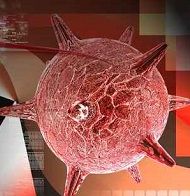Detecting Herpes-6 in Critical Patients
Human herpes virus 6 (HHV-6) is usually not life threatening. But it can be lethal in patients who are immunocompromised. A new testing technique called Digital Droplet PCR appears to work better than the usual procedures.

Human herpes virus 6 (HHV-6) is usually not life-threatening. But it can be lethal in patients who are immunocompromised. A new testing technique called digital droplet PCR appears to work better than the usual procedures.
In a report due presented April 19 at the American Academy of Neurology 2015 annual meeting in Washington, DC, Bridgette Billioux, MD, and colleagues at the National Institutes of Health in Bethesda, MD, noted the HHV-6 virus is ubiquitous and known mostly for causing roseola.
“Rarely this virus reactivates in immunocompromised individuals and can cause a severe limbic encephalitis characterized by seizures and personality changes,” the team wrote. Diagnosis is usually made by assessing central nervous system dysfunction and finding the virus in cerebrospinal fluid (CSF) through polymerase chain reaction (PCR) testing.
But PCR detection of HHV-6 “is not well standardized, which can be problematic in accurate diagnosis” Billioux said.
To improve that accuracy, the team used a third-generation PCR techniques, digital droplet (DdPCR.) They used DdPCR to test samples from a patient who died of post-transplant encephalitis. The samples—taken both before and after the patient died—were from blood, lung fluid, and the brain.
They found that there were high viral levels of HHV-6B in several samples taken before death but that they decreased with treatment. But at autopsy, there were very high levels of the virus’s DNA in the brain particularly in mesial structures such as the hippocampus and basal ganglia.
That showed that while the infection appeared to losing ground, it really was not.
In reaching that conclusion, the team found DdPCR “is a very useful tool in the accurate and precise quantification of HHV-6 viral DNA.”